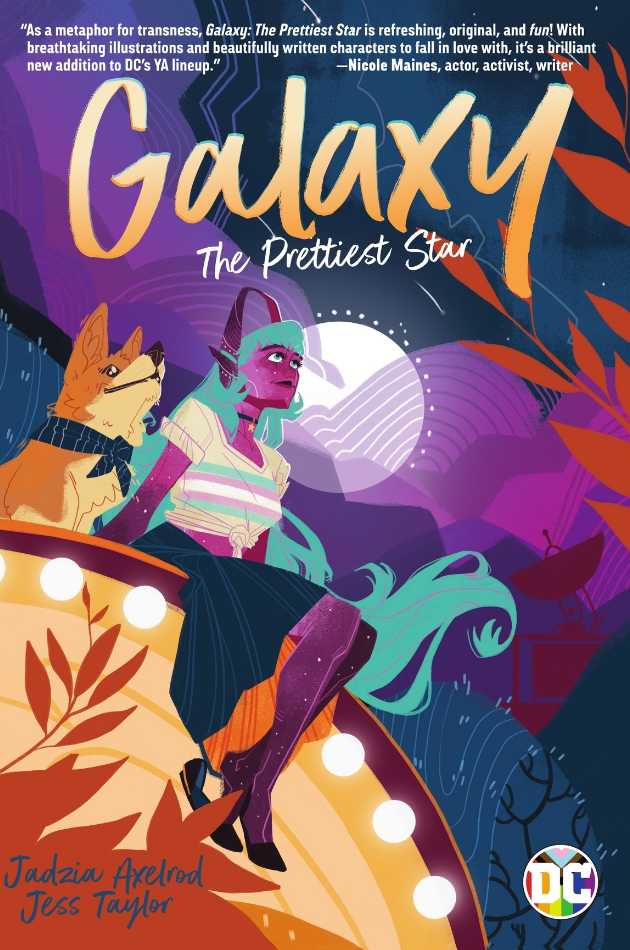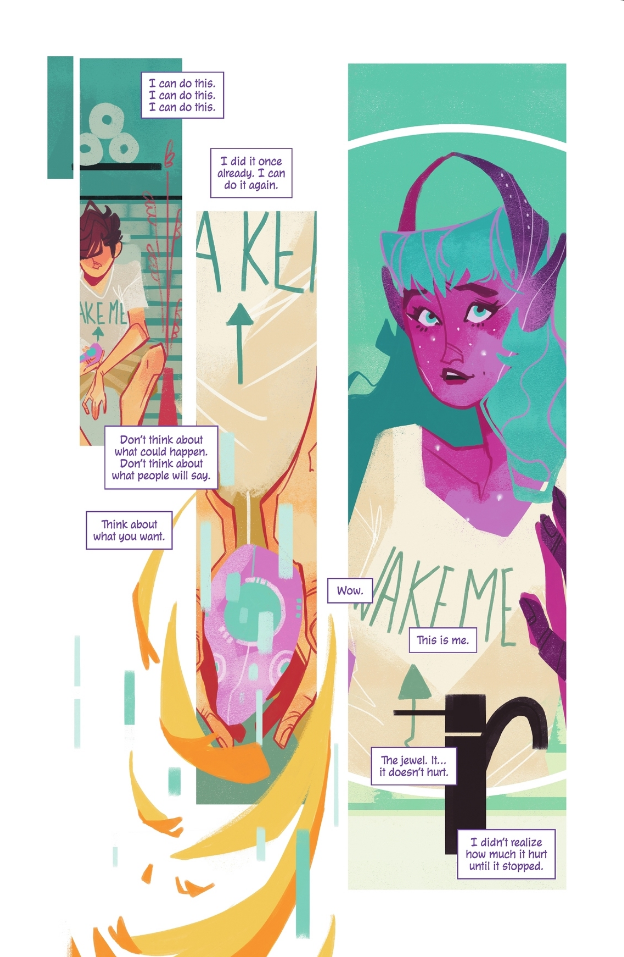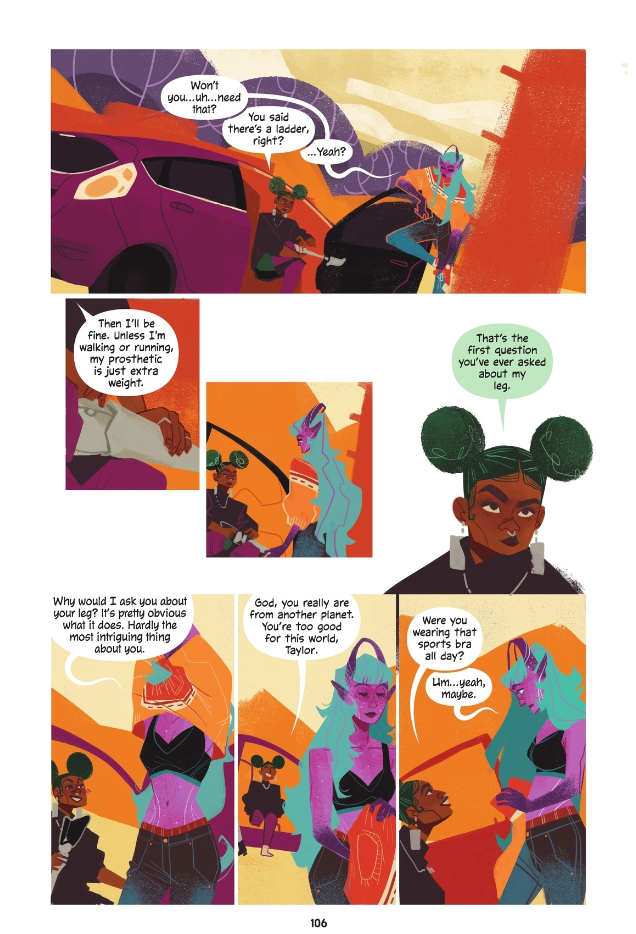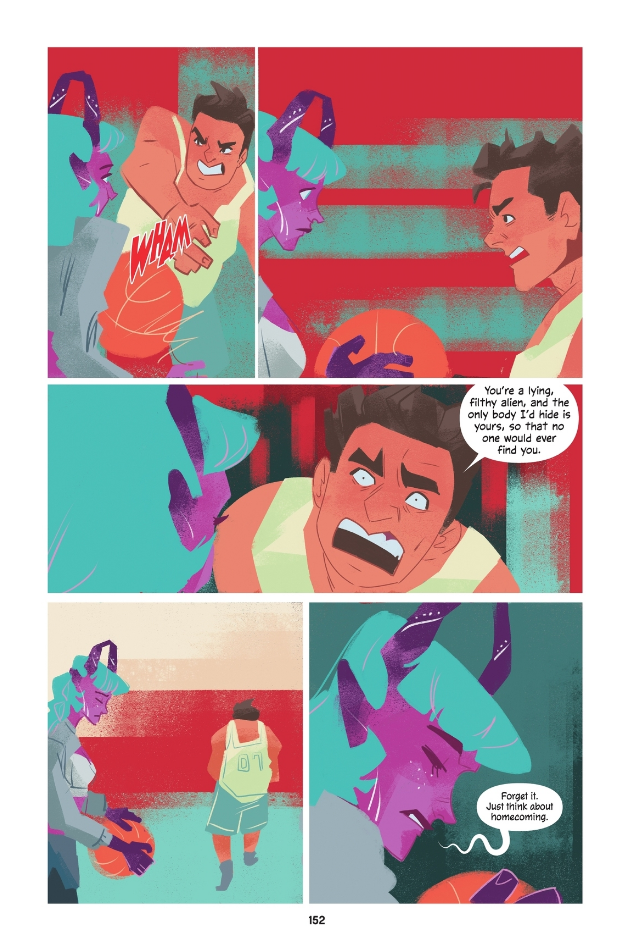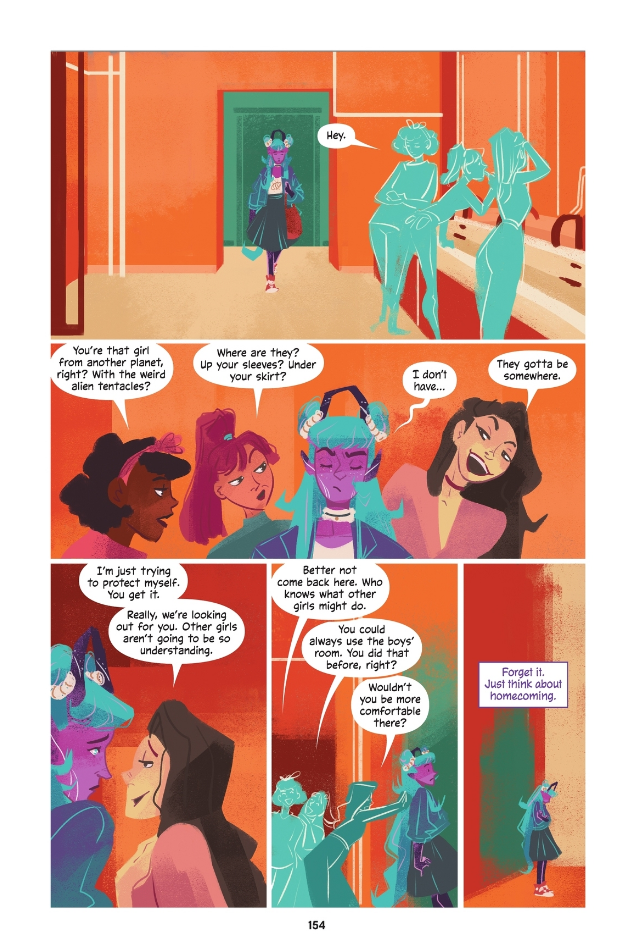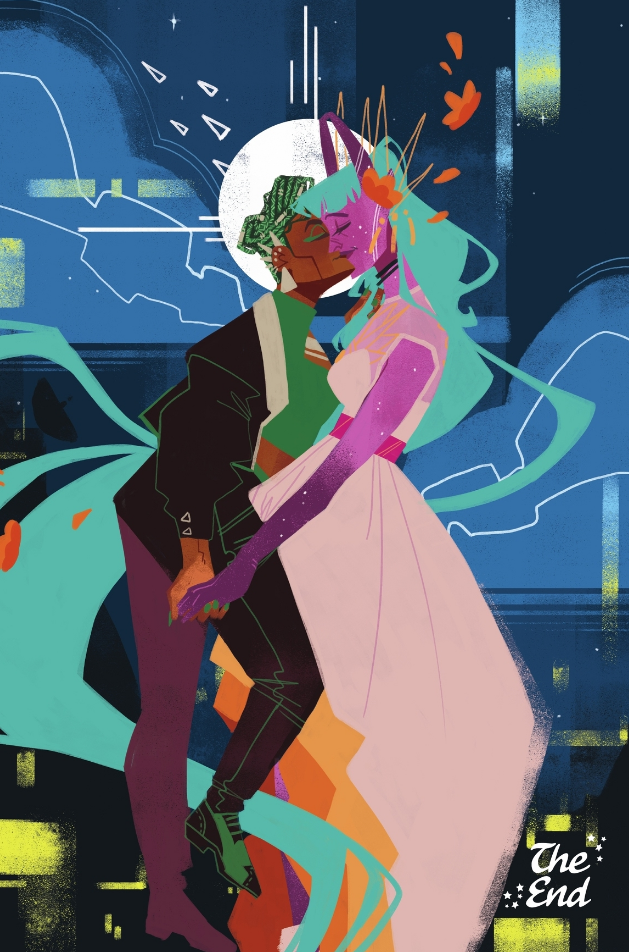Galaxy: The Prettiest Star (Review)
By Jadzia Axelrod & Jess Taylor
(Read digitally)
Taelyr Ilextrix-spiir Biarxiiai, the Cyandiian princess is a refugee on Earth, in a world where Superman exists. Despite Superman's own alien identity, the town of Ozma is not quite ready to embrace aliens as is told through Buck's opening statements when we meet him in Chapter 1: Aladdin Sane. "An invasion of one is still an invasion." Buck is Taelyr's best friend and clearly distrustful of aliens as is the culture of their insular town. With these kinds of ideologies, it then tracks that just two pages later, a homophobic slur is lodged at Taelyr and Buck. I think it goes without saying that Taelyr is not "out" to Buck when they are introduced in the story. "Out" in the context of this story has more than one meaning because when Taelyr is introduced, we not only see her as human but as a boy as well. The story uses the alien identity as metaphor but it also provides a lens to explore the struggles of transness, particularly trans womanhood.
Jadzia Axelrod masterfully crafts beats and dialogue for Jess Taylor's art to perfectly compliment. From the cover and the trans flag printed so plainly on Taelyr's shirt, you understand right away what the story is going to comment on. One of the most grabbing things on the pages is the way Jess Taylor structures their panels. They move the eye through out of panel elements and just a general mastery of eye direction and focus. Allowing there to be such stark balancing between gutters and panels really forces the reader to pay attention to what is being drawn and what is being said. There was not a single moment looking at their work that I found myself lost, though I initially was unsure of my feelings on how the environments were rendered and their blocking figures in with a single color. By page 17, I was entirely sold on everything being done artistically as the character moment and the coloring choices all sung in harmony. There is an art deco-esque quality to Taylor's work that meshes so well with the story being told here and a confidence in their work that makes their creative decisions feel like no-brainers. The soft quality of their work is heightened by the color holds applied to their lines. Taylor's double page spreads are something to behold and a visual treat whenever they would appear. Lucky me, there was at least one double page spread per chapter, with the only exception being Chapter 4: Space Oddity which, based on the isolation of Taelyr within the chapter, is a fitting decision.
Jadzia Axelrod's voice as a writer is so clear in the way she approaches the nuance of identity and the highs and lows of a trans experience. The theme of conformity is ever-present and that idea would seek to see Taelyr resign herself to the identity created for her by Phil, her father figure and the society around her. A found family of Cyandiian refugees, Phil functioned as a father, Carl functioned as her brother figure, Sally as a brother figure, and Argus as their family dog. Phil kept Taelyr from experiencing a normal life, never allowing her to hang out with people because of some idea that he was protecting her from the Vane and in turn protecting their entire family. Forcing them into human disguises with the device, the Ehsar, Phil's concept of normalcy was built around sitcoms starring white families. To further enforce his authority over Taelyr, Argus functioned as a watchdog and an informant, which despite his cute Corgi appearance made him complicit in Taelyr's oppression. Carl deeply misses his own Cyandiian self and resents the situation they're in. His feelings compliment Taelyr's and at the same time provide a separate lens to view the impact of their situation. Taelyr never has a moment to embrace herself as Argus is constantly keeping watch, making her new life more of a prison than it already is. Where home is meant to be a safe space, of true acceptance, it cannot even be that. Phil won't even allow them to be their Cyandiian selves in the safety of their own home because of his fear.
When Taelyr finally gets hold of the Ehsar and changes into herself, it's beautiful. There is something so raw about Taelyr's pain in suppressing who she really is. This pain is registered as internal because of the jewel inside of her which is punctuated by the statement "I didn't realize how much it hurt until it stopped." Taelyr being willing to step out of the closet with Kat is a wonderful set up for a friend and partner that wants her to be herself. Kat additionally functions as the lens for which to truly explore the regressive and misogynist ideas that Buck has. It's shown in Buck's jealousy, his attempts to put down Taelyr with misogynist terms, and further his negging of Taelyr. Buck's fall from grace is complemented by Taelyr's own learning to to fly. A dynamic I personally love is that the story is so clearly not colorblind nor could it be, as Taelyr does not "pass" like Superman can.
From another side of racial analysis, I adore the attention to detail with Kat, from her hair and how it's styled, to her head wrap when we see her in bed, to the color of her skin. It is wonderful to see Kat on the page, to see a plus sized and disabled Black woman be presented in the way that she was, especially with a culture of ableism and fatphobia. Kat is given the space to be herself and Taelyr sees her for all that she is, not as a person to be shamed or pitied, just as a normal person. The moment where the pair climb the ladder where Taelyr asks about Kat's prosthetic only out of sheer concern and not a morbid fascination so elegantly highlights the nature of them seeing each other. Kat validates Taelyr and pushes her to be herself, all the while being a fully realized character with motivations and her own story.
When looking at Taelyr's shifting gender identity and being "out" the story makes it a point to highlight the reality of what that looks like. Where there was celebration between her and Kat, the world is not always so kind. As politicians, authors, institutions, and individuals continue to attack trans identities we understand that harm comes to our trans and nonbinary friends, family, and colleagues. It is then our job as allies to affirm them and ensure that they have a safe space in our presence. Taelyr is ostracized by students that once didn't even think to look her way, the principal of the school invalidates her identity because he cannot reconcile the Taelyr that he knew with the Taelyr before him, and Buck puts the final nail in the coffin of their friendship. Within Chapter 4, Axelrod and Taylor masterfully illustrate how isolating coming out can be. Buck, who was once Taelyr's closest friend, feels betrayed in not knowing about her identities. Buck is not entirely invalid in feeling hurt as sometimes the journey of self-discovery can affect people around us but, to this end Taelyr did her best to be accountable and transparent. The time of transition should be one celebrated by the people closest yet Buck made his choice in spite of Taelyr's efforts, in spite of a desire for reconciliation.
Directly following their friendship's conclusion, a popular question about bathroom safety is played out on page 154. Taelyr simply seeks to use the restroom but instead is harassed by the cis women present. The question of bathroom safety is always disingenuous and the nature of that is displayed here as she is treated like a specimen, and "tentacles" are questioned as a stand-in for a phallus. She is expelled from the school because of the closed mindedness of people in the district and is banned from the homecoming dance. Her isolation becomes unbearable and her response is to become violent. She almost goes full Carrie and her rage and it's motivations are not unreasonable. As is reflected in other moments of her intense emotional anguish, she thinks about what she could do but ultimately resigns herself to leave and return home.
She bought an amazing dress with Kat and instead of an act of terrorism, she chooses an act of resistance. Taelyr decides to go to homecoming with Kat regardless of her ban and expulsion. This is met with conflict by Phil who's own fear of oppression has turned him into an oppressor. Sally's un-corrupted view of people and the world serves as a counter for this, that validates Taelyr and challenges Phil's own perspective. Phil concedes, finally seeing her with the aid of Sally and Carl, finally allowing their home to be a safe space regardless of the threats that may come. There is a recognition that hate and threats could always find them and that they can't live in fear which gives us the satisfying conclusion of Kat and Taelyr, though not allowed into the dance, dancing by themselves, away from judgement and above it all.
Galaxy: The Prettiest Star is a beautiful metaphor for transness, with nuanced writing and art that perfectly compliments the story being told. As oppression and bigotry persist, this story is a light that pushes back against that. It not only looks to validate trans identities but also to uplift them. Taelyr is beautiful as is every trans person and the world does not have the place to tell them otherwise. I cannot praise this story enough for its visuals, for its writing, for its messaging. This is a must read and Taelyr (or "Galaxy" as Kat dubbed her superhero identity) is the prettiest star.


